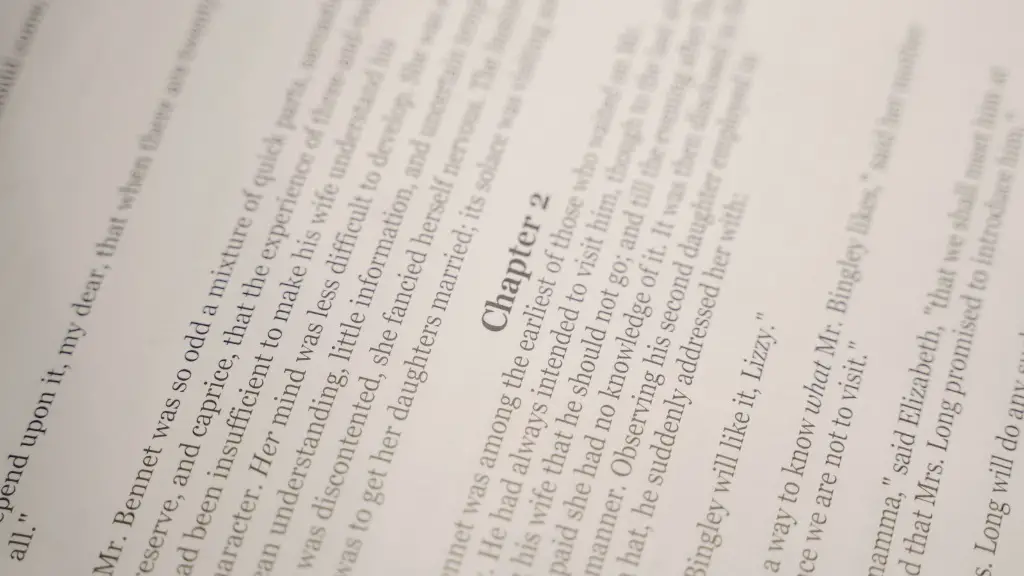Robert Frost is one of the acclaimed poets of the twentieth century. His work has been widely anthologized over the years, and it is often seen as a bridge between traditional and modern American poetry. Frost typically wrote in the lyric tradition of poetry, combining factual details of the physical world with metaphysical ideas of the imagination and the heart. He often utilizes familiar subjects and tropes, such as nature, seasons, and the rural life, to portray the ageless themes of love, loss, and mortality. His style is often characterized by pointed use of imagery and figurative language, as he delves into the nuances of everyday life with an exact and often humorous precision.
Frost primarily wrote in the lyrical form of poetry, with his works often containing conversational language, vivid imagery and timeless themes. He often wrote about everyday life, love and death. One of his most well-known works, “The Road Not Taken”, exemplifies his tendency to employ simple yet powerful metaphors to convey complex messages. The seemingly innocent poem about a path in the woods becomes a metaphor for the decisions that individuals must face in life and the consequences that come with them. Frost used pastoral images of nature and rustic scenes to capture the struggles between individualism and conformity.
In addition to his lyric poetry, Frost also wrote narrative poetry, which explored topics such as friendship, family, and the ironic ingenuity of the human spirit. Often these pieces utilized light humor, such as in the poem “Mending Wall”, to shed light on the more serious themes of his work. He also wrote dramatic verse, with plays like “A Masque of Reason” being a prime example. In this work, Frost attempted to blend artistry and philosophical ideas in a dramatic narrative set in a fantastical landscape.
Frost’s lyric, narrative, and dramatic poetry are all connected by his unique voice, which speaks to both the mind and the heart. His use of everyday language and vernacular makes his poetry accessible both to new and experienced readers. His works weave together imagery and ideas in such a way as to draw out the underlying truth in the simplest of things. His poetry provides a window into the often overlooked beauty of the everyday, and speaks to both the joy and the pain of life.
Indeed, Robert Frost’s poetry is timeless and ever relevant, exploring universal themes with a distinctive style and a bittersweet sense of humor. His ability to capture the nuances of the physical world combined with a metaphysical perspective makes his work both accessible and profound, and has served to inspire many generations of readers and poets.
Lyrical Poetry
Robert Frost’s lyrical poetry speaks to the idea of the inner life, drawing from the sources of nature, love, loss, and mortality. His use of everyday language and conversational style makes his works both accessible and profound. Furthermore, Frost constantly makes use of vivid imagery and structured rhyme and meter to create the effect of a story or a ballad rather than a lecture or sermon. This approach allows him to explore themes of nature and the rural life in a subtle and often humorous way.
Frost’s most famous works often make use of pointed, clever metaphors to convey deeper ideas. For example, his poem “The Road Not Taken” explores the consequences of the decisions that people must make in life, presenting them through the simple image of a path in the woods. Similarly, the poem “Mending Wall” is a narrative about the boundaries that people must accept and respect in relationships. Despite their seemingly innocent appearance, these works and others by Frost contain a thoughtful insight into the complexities of life, and their symbolism and structure make them among the most adored works of modern poetry.
In addition to his more famous works, Frost wrote several lesser-known lyric poems that encapsulate the same use of imagery and artful language. These poems explore a variety of themes, from love and faith to death and mortality. Through a close examination of everyday life, Frost conveys his thoughts and feelings on these topics in a lyrical, captivating manner. His works speak to the deeper experience of life and humanity, and they challenge readers to look deeper and think more deeply about life’s truths.
Nature
One of the core elements of Robert Frost’s poetry is his use of natural imagery to explore larger themes. He takes the familiar images of nature and rural life, like woods and fences, and uses them to convey ideas of love, loss, and mortality. His poems often take readers on a journey into the mundane and overlooked aspects of the physical world, and he uses his words to open up the minds of those who are listening.
Frost often utilizes pastoral elements to reveal the complexities of life and the struggles between freedom and restraint. His poems explore the idea of individualism, examining both the rewards and the consequences that come with making one’s own path in life. Through his poems, Frost also reveals the beauty in nature and our shared connection to the physical world. He manages to convey the cycle of life and death in a delicate and sensitive manner, using metaphors and symbols to capture the delicate balance of existence.
In addition to his lyrical works, Frost often wrote in a narrative style, echoing the lyrical structure found in his other works, while also providing more of an insight into the characters he created. By exploring the relationship between ourselves and the natural world, Frost reveals the same themes that he has explored in his lyric works, with a focus on our intertwined yet distinct relationship with nature. His ability to capture the beauty and complexity of the physical world in a poetic form is what makes his work so timeless and revered.
Narrative Poetry
Frost also wrote in the narrative form of poetry, exploring the complexities of everyday life, friendship, and family dynamics. Rather than relying on symbolism or metaphors, this style of poetry allows for Frost to express himself directly and openly. His narrative poems often contain light humor, which adds another layer of depth to his works. Through this style, Frost is able to explore the same universal themes of love, loss, and mortality in a simple and witty manner.
One of Frost’s best-known narrative works is the poem “Mending Wall”, which tells the story of two neighbors attempting to rebuild a wall that separates their properties. At first glance, the poem appears to be a funny piece about two neighbors attempting a futile task. However, Frost utilizes the poem to explore the idea of boundaries, both real and imagined. He speaks to the idea of everyday struggles between conformity and individualism, drawing out the underlying tension present in human relationships.
Frost wrote multiple narrative poems about the various relationships we have with the people in our lives. He utilizes a humorous tone and conversational language to communicate complex themes, such as distance and intimacy, and the struggles of communication and understanding. Through these works, Frost is able to provide readers with thoughtful insight into the subtle rewards and responsibilities that come with meaningful relationships.
Dramatic Verse
Frost also wrote in the dramatic style of poetry, with works like “A Masque of Reason” being one of his most acclaimed pieces. In this work, Frost addressed philosophical and theological topics, weaving together elements of fantasy and real-world predicaments. The narrative of this play follows two characters attempting to resolve a conflict between faith and reason. Throughout the work, Frost utilized humor and whimsy to speak to the struggles that can arise from attempting to reconcile opposites.
This style of poetry allowed Frost to explore philosophical ideas, as well as his other core themes exploring life and mortality. The central question of faith versus reason provides a unique window into Frost’s thoughts, and allows readers to delve into the nuances of his work. Through the play, Frost conveys his thoughts on human nature, grace, and ultimate truth, using characters and a simulated universe to bring his words to life.
By combining different styles of poetry, Frost was able to express himself in a unique and powerful way. His use of lyrical language, narrative structure, and dramatic verse allowed him to explore core themes in meaningful and often humorous ways. Frost’s works consistently challenge readers to rethink the nature of truth, beauty, and faith, and they remain relevant and inspiring to this day.




